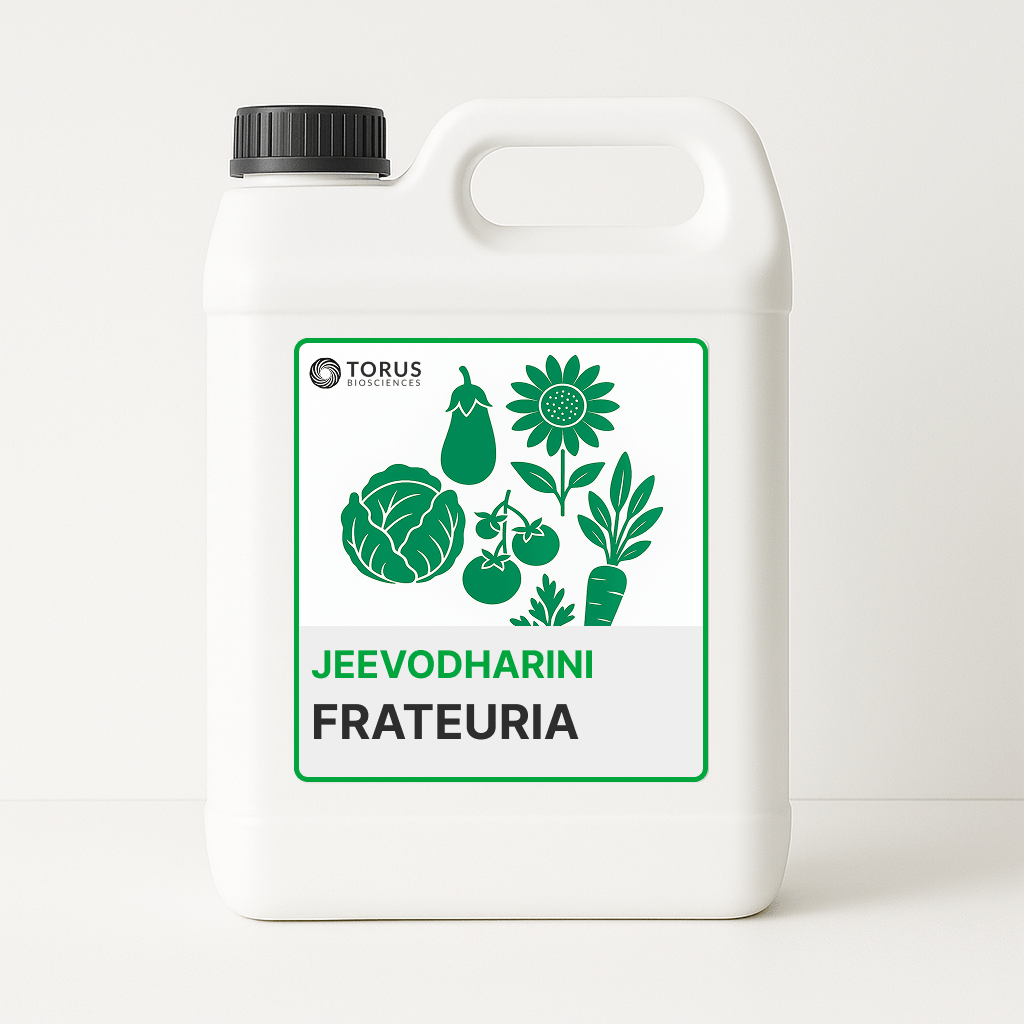
Frateuria
A potassium mobilizing bacteria that helps plants access potassium locked in the soil, improving nutrient uptake and plant growth.

Frateuria aurantia is a gram-negative, aerobic bacterium that functions as a potent potassium-mobilizing microorganism in agricultural soils. This specialized bacterium secretes organic acids and specific enzymes that weather potassium-bearing minerals, releasing this essential macronutrient from its bound forms and making it available for plant uptake.
Research studies demonstrate that Frateuria inoculation significantly enhances potassium availability and uptake in diverse crops, particularly in soils where potassium is abundant but exists primarily in insoluble mineral forms such as feldspar, mica, and illite. While focused primarily on potassium nutrition, Frateuria also contributes to broader plant growth promotion through multiple secondary mechanisms.
Benefits
-
Potassium Mobilization: Frateuria aurantia secretes organic acids that accelerate the weathering of potassium-bearing minerals in soil, converting bound potassium into plant-available forms. This microbial solubilization can mobilize 15-30% of fixed soil potassium, dramatically improving potassium use efficiency and reducing fertilizer requirements by 20-40%.
-
Enhanced Crop Yields: Field trials across various cropping systems show consistent yield increases of 10-25% following Frateuria application, with the most significant responses observed in high-potassium-demanding crops like banana, sugarcane, and potato, particularly in soils with adequate total potassium but limited available forms.
-
Improved Stress Tolerance: Potassium plays a crucial role in osmotic regulation, stomatal function, and enzyme activation. Frateuria-treated plants demonstrate enhanced drought tolerance with 20-35% improvements in relative water content under water deficit conditions and increased resilience to temperature extremes due to improved potassium status.
-
Root Development Stimulation: Beyond nutrient mobilization, Frateuria produces auxin-like plant growth regulators that enhance root development. Treated plants typically show 15-30% increases in root biomass and root length, with more extensive branching patterns that improve overall nutrient exploration and uptake.
-
Soil Fertility Enhancement: The organic acids produced by Frateuria not only mobilize potassium but also improve the availability of other mineral nutrients, particularly phosphorus and certain micronutrients. This creates a more balanced nutrient profile in the rhizosphere and improves overall soil fertility status.
-
Reduced Fertilizer Dependency: By activating soil’s native potassium reserves, Frateuria application allows for 20-40% reductions in potassium fertilizer applications without compromising yield. This not only reduces input costs but also minimizes the environmental impacts associated with excessive fertilizer use.
-
Improved Crop Quality: Adequate potassium nutrition enhances various quality parameters in crops. Frateuria-treated plants demonstrate improvements in fruit size, sugar content (increased by 8-15% in fruits), shelf life, and various organoleptic properties due to optimized potassium nutrition.
Suitable Crops
Frateuria aurantia shows particularly strong benefits in potassium-demanding crops:
-
Fruits: Banana, citrus, mango, and other fruits show 15-25% yield increases, with improved fruit size, sugar content, and post-harvest quality. Banana bunches from Frateuria-treated plants typically show 12-20% increases in bunch weight and finger size.
-
Vegetables: Potato, tomato, and other vegetable crops demonstrate 15-30% yield improvements with enhanced quality parameters. Potato tuber size and specific gravity improvements are particularly significant with adequate potassium mobilization.
-
Sugarcane: As a high potassium-demanding crop, sugarcane responds exceptionally well to Frateuria application, with documented yield increases of 15-25% and sugar content improvements of 0.5-1.2 percentage points in field trials.
-
Cereals: Rice, wheat, and maize show moderate yield responses of 10-20%, with the most significant benefits observed during grain filling stages when potassium demand is highest for translocation of photosynthates.
-
Oilseeds: Sunflower, soybean, and groundnut demonstrate improved oil content (increased by 5-10%) and seed size when treated with potassium-mobilizing bacteria, particularly in potassium-limited soils.
-
High-Value Crops: Tea, coffee, and spice crops show improved growth parameters, yield components, and quality factors following Frateuria application, with typical yield enhancements of 12-22%.
-
Mica-Rich Soils: The bacterium shows its most dramatic benefits in soils containing potassium-rich minerals like mica, illite, and feldspar, where chemical potassium fertilizers can be partially or completely replaced by biological mobilization.
For optimal results, apply Frateuria aurantia to the root zone during early growth stages or at planting. The bacteria establish most effectively in well-aerated soils with pH between 5.5-7.5 and adequate organic matter to support microbial metabolism. In perennial crops, application during periods of active root growth ensures optimal colonization and potassium mobilization.
Frateuria works synergistically with other biofertilizers, particularly phosphate solubilizers like Bacillus megaterium, creating complementary nutrient mobilization systems that address multiple macronutrient needs simultaneously. This bacterial consortium approach offers the most comprehensive benefits for balanced crop nutrition in sustainable farming systems.
Key Microorganism
Frateuria aurantia: This specialized bacterium produces potent organic acids (primarily citric, oxalic, and tartaric acids) that dissolve potassium-bearing soil minerals through both acidification and chelation mechanisms. The bacteria secrete these acids at concentrations sufficient to create localized pH reductions in the rhizosphere, accelerating the weathering of mineral-bound potassium. Frateuria strains can mobilize 15-30% of fixed soil potassium, converting it to plant-available forms. Additionally, the bacterium produces auxin-like plant growth regulators and forms robust biofilms that enhance its persistence in the rhizosphere under varying environmental conditions.
Mechanism of Action
-
Organic Acid Production: Frateuria aurantia secretes primarily citric, oxalic, and tartaric acids that solubilize potassium through multiple mechanisms:
- Direct acidification of the rhizosphere microenvironment
- Chelation of structural cations in mineral lattices
- Exchange reactions that release potassium ions from clay interlayers
- Dissolution of potassium-bearing feldspars and micas
-
Exopolysaccharide Secretion: The bacterium produces extracellular polysaccharides that form protective biofilms around soil particles and root surfaces. These biofilms create microenvironments where organic acids can concentrate and effectively weather minerals without being diluted in the bulk soil solution.
-
Rhizosphere Colonization: Frateuria exhibits specific chemotaxis toward root exudates and efficiently colonizes the rhizosphere and rhizoplane where its potassium-mobilizing activities have the most direct benefit to plants.
-
Auxin Production: Many Frateuria strains produce indole-3-acetic acid (IAA) and related auxin-like compounds that stimulate root development, creating larger root systems that can more effectively explore soil volumes and access mobilized nutrients.
-
Siderophore Formation: The bacteria produce iron-chelating siderophores that not only make iron more available but also indirectly enhance potassium release from minerals where iron oxides coat potassium-bearing surfaces.
-
Mineral Surface Interaction: Frateuria cells physically attach to mineral surfaces, creating microenvironments at the bacteria-mineral interface where organic acids and other weathering compounds can act directly on mineral structures, accelerating potassium release.
Storage and Usage Instructions
For detailed application instructions, please refer to our Root Application Guide.
Available Variants




Boost productivity with our sustainable biological solutions.
Trusted by agricultural and waste management professionals for superior results.
Request pricing & availability